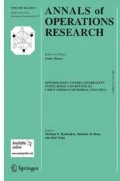Abstract
Problems of scheduling n jobs on a single machine to maximize regular objective functions are studied. Precedence constraints may be given on the set of jobs and the jobs may have different release times. Schedules of interest are only those for which the jobs cannot be shifted to start earlier without changing job sequence or violating release times or precedence constraints. Solutions to the maximization problems provide an information about how poorly such schedules can perform. The most general problem of maximizing maximum cost is shown to be reducible to n similar problems of scheduling n−1 jobs available at the same time. It is solved in O(mn+n 2) time, where m is the number of arcs in the precedence graph. When all release times are equal to zero, the problem of maximizing the total weighted completion time or the weighted number of late jobs is equivalent to its minimization counterpart with precedence constraints reversed with respect to the original ones. If there are no precedence constraints, the problem of maximizing arbitrary regular function reduces to n similar problems of scheduling n−1 jobs available at the same time.
Similar content being viewed by others
References
Adolphson, D. and T.C. Hu. (1973). “Optimal Linear Ordering.” SIAM Journal of Applied Mathematics 25, 403–423.
Aloulou, M.A. and M.-C. Portmann. (2001). “Incorporating Flexibility in Job Sequencing for the Single Machine TotalWeighted Tardiness Problem with Release Dates.” In 10th Annual Industrial Engineering Research Conference, in CD-ROM.
Baker, K.R. (1974). Introduction to Sequencing and Scheduling. New York: Wiley.
Billaut, J.C. and F. Roubellat. (1996). “A New Method for Workshop Real Time Scheduling.” International Journal of Production Research 34, 1555–1579.
Daniels, R.L. and P. Kouvelis. (1995). “Robust Scheduling to Hedge Against Processing Time Uncertainty in Single Stage Production.” Management Science 41, 363–376.
Graham, R.L., E.L. Lawler, J.K. Lenstra, and A.H.G. Rinnooy Kan. (1979). “Optimization and Approximation in Deterministic Machine Scheduling: A Survey.” Annals of Discrete Mathematics 5, 287–326.
Karp, R.M. (1972). “Reducibility Among Combinatorial Problems.” In R.E. Miller and J.W. Thatcher (eds.), Complexity of Computer Computations, pp. 85–103. New York: Plenum Press.
Lawler, E.L. (1973). “Optimal Sequencing of a Single Machine Subject to Precedence Constraints.” Management Science 19, 544–546.
Lawler, E.L. (1978). “Sequencing Jobs to Minimize Total Weighted Completion Time Subject to Precedence Constraints,” Annals of Discrete Mathematics 2, 75–90.
Lawler, E.L., J.K. Lenstra, A.H.G. Rinnooy Kan, and D.B. Shmoys. (1993). “Sequencing and Scheduling: Algorithms and Complexity.” In S.C. Graves, A.H.G. Rinnooy Kan, and P.H. Zipkin (eds.), Logistics of Production and Inventory, pp. 445–452. Handbook in Operations Research and Management Science, Vol. 4.
Lenstra, J.K. and A.H.G. Rinnooy Kan. (1978). “Complexity of Scheduling Under Precedence Constraints.” Operations Research 26, 22–35.
Lenstra, J.K. and A.H.G. Rinnooy Kan. (1980). “Complexity Results for Scheduling Chains on a Single Machine.” European Journal of Operational Research 4, 270–275.
Lenstra, J.K., A.H.G. Rinnooy Kan, and P. Brucker. (1977). “Complexity of Machine Scheduling Problems.” Annals of Discrete Mathematics 1, 343–362.
Moore, J.M. (1968). “A n Job, One Machine Sequencing Algorithm for Minimizing the Number of Late Jobs.” Management Science 15, 102–109.
Posner, M.E. (1990). “Reducibility Among Weighted Completion Time Scheduling Problems.” Annals of Operations Research 26, 91–101.
Reingold, E.M., J. Nievergelt, and N. Deo. (1977). Combinatorial Algorithms, Theory and Practice. Englewood Cliffs, NJ: Prentice-Hall.
Smith, W.E. (1956). “Various Optimizers for Single-Stage Production.” Naval Research Logistics Quarterly 3, 59–66.
Author information
Authors and Affiliations
Rights and permissions
About this article
Cite this article
Aloulou, M.A., Kovalyov, M.Y. & Portmann, MC. Maximization Problems in Single Machine Scheduling. Annals of Operations Research 129, 21–32 (2004). https://doi.org/10.1023/B:ANOR.0000030679.25466.02
Issue Date:
DOI: https://doi.org/10.1023/B:ANOR.0000030679.25466.02




